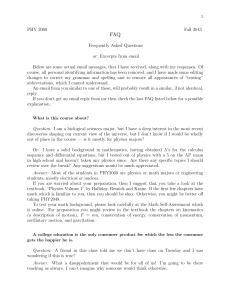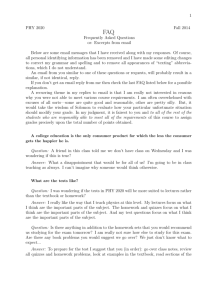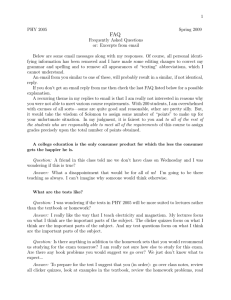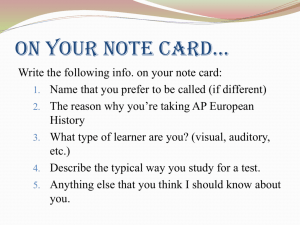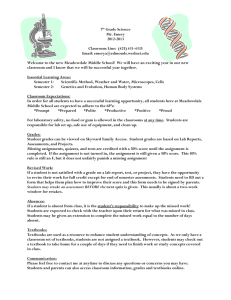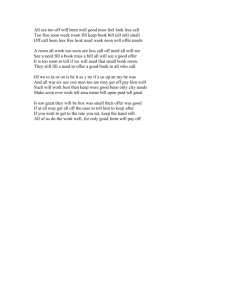FAQ
advertisement
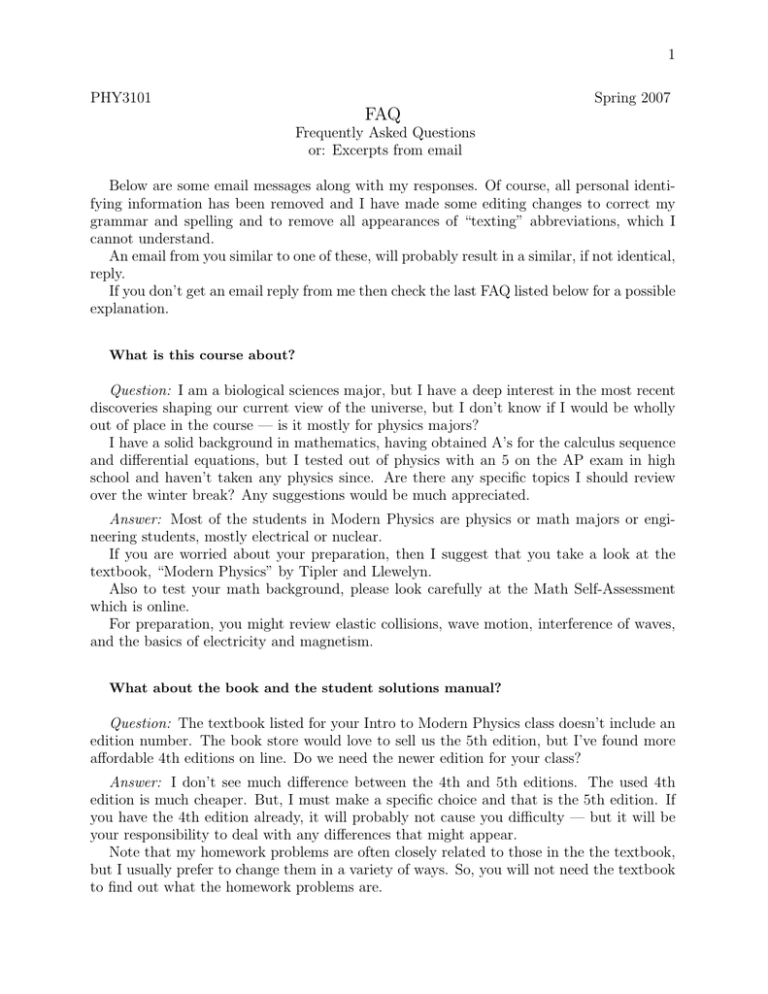
1 PHY3101 Spring 2007 FAQ Frequently Asked Questions or: Excerpts from email Below are some email messages along with my responses. Of course, all personal identifying information has been removed and I have made some editing changes to correct my grammar and spelling and to remove all appearances of “texting” abbreviations, which I cannot understand. An email from you similar to one of these, will probably result in a similar, if not identical, reply. If you don’t get an email reply from me then check the last FAQ listed below for a possible explanation. What is this course about? Question: I am a biological sciences major, but I have a deep interest in the most recent discoveries shaping our current view of the universe, but I don’t know if I would be wholly out of place in the course — is it mostly for physics majors? I have a solid background in mathematics, having obtained A’s for the calculus sequence and differential equations, but I tested out of physics with an 5 on the AP exam in high school and haven’t taken any physics since. Are there any specific topics I should review over the winter break? Any suggestions would be much appreciated. Answer: Most of the students in Modern Physics are physics or math majors or engineering students, mostly electrical or nuclear. If you are worried about your preparation, then I suggest that you take a look at the textbook, “Modern Physics” by Tipler and Llewelyn. Also to test your math background, please look carefully at the Math Self-Assessment which is online. For preparation, you might review elastic collisions, wave motion, interference of waves, and the basics of electricity and magnetism. What about the book and the student solutions manual? Question: The textbook listed for your Intro to Modern Physics class doesn’t include an edition number. The book store would love to sell us the 5th edition, but I’ve found more affordable 4th editions on line. Do we need the newer edition for your class? Answer: I don’t see much difference between the 4th and 5th editions. The used 4th edition is much cheaper. But, I must make a specific choice and that is the 5th edition. If you have the 4th edition already, it will probably not cause you difficulty — but it will be your responsibility to deal with any differences that might appear. Note that my homework problems are often closely related to those in the the textbook, but I usually prefer to change them in a variety of ways. So, you will not need the textbook to find out what the homework problems are. 2 Question: I was just wondering if you would recommend buying the student solutions manual for the book, if that would help us overall in the course? Answer: I almost never assign a problem that is identical to one of the problems in the book. I have mixed feelings about the solution manual. I have found a number of errors in it—mostly typo’s but some errors were really based on misunderstanding. However, for the most part its okay. And sometimes seeing how a problem is solved can be a big help in understanding. Perhaps, your best bet would be to find a solution manual that you could borrow and see for yourself if it looks useful. A college education is the only consumer product for which the less the consumer gets the happier he is. Question: A friend in Modern told me we don’t have class on Monday and I was wondering if this is true? Answer: What a disappointment that would be for all of us! I’m going to be there teaching as always. I can’t imagine why someone would think otherwise. What is important about homework? Question: I have a simple question concerning problem number 5 on the current HW assignment. Are we suppose to assume the penny is entirely formed of copper or are we to use the current construction of the coin to answer the problem (where zinc is more prevalent)? Answer: My philosophy on homework questions is to check general understanding rather than to try to get an accurate number. So within a reasonable factor the makeup of a penny makes no difference. What are the tests like? Question: I was wondering if the tests in Modern will be more suited to lectures rather than the textbook, like our homework? Answer: I really like the way that I teach relativity, and I don’t care for some parts of the book’s treatment. Once we get into quantum mechanics, nuclear and atomic physics I will follow the book more closely. My lectures focus on what I think are the important parts of the subject. And my test questions usually focus on what I think are the important parts of the subject. Question: Is there anything in addition to the homework sets that you would recommend us studying for the exam tomorrow? I am really not sure how else to study for this exam. Are there any book problems you would suggest we go over? We just don’t know what to expect... Answer: To prepare for the test I suggest that you (in order): go over class notes, review the homework problems, read sections of the text that are related to the lectures, and try to find problems from the book that involve the same subjects. 3 In general a student who understands the homework problems and has been awake in class should do just fine on the test. Question: I think we did not have ample time to successfully complete the test. If there is any way to get a room and have the test during the 8-10pm periods that would be sufficient. I noticed that not one person finished the exam before time was called. I did not feel that 55 minutes was enough time to complete the computations required in this exam. If you could please consider this message and give us more time for the next exam, that would be greatly appreciated. Answer: The tests are open book tests. Typically students often spend too much time trying to learn the material during the test or hope to find the magic formula, which is rarely in the book. Given enough time anyone could do quite well on an open book test. In my opinion the test was long, but not unduly long. Question: Will the test cover sections # and #? I don’t believe we went over those in class and they’re not included in the homework. Answer: As to sections # and # ... I didn’t talk about them in class and there weren’t any homework problems on them. So, if I were studying for the test then I wouldn’t spend much time on them. Question: For the test coming up you said no photocopies, but is it okay to have the printed questions for the homework without the solutions? Answer: Please bring the questions! I just want to be sure that you also bring along your own answers but not mine. What should I expect if I am late with homework, or miss class or a test and would like special consideration? Question: When I got up an hour late this morning and saw that the class hour has already passed, I thought to myself, ah not the second class! I don’t plan on another miss again. I finished the homework last night. Is it ok that I turn it in to your office before 4:30pm today? Answer: Absolutely! Everyone gets a no cost, homework extension until 4:30pm. Question: I missed PHY3101 today due to a more adverse parking situation than expected. I was wondering if you could inform me as to what topics were covered today in class. Answer: Chapter 2. If you miss class it is your responsibility to find out was covered. I spent fifty minutes on the material in class. I won’t spend fifty minutes with you individually covering the same material. So don’t ask me what I said in class. Question: I am writing you because my car broke down today at about 4:00, as I was on the way to turn in homework set #4 to you at your office, as I normally do. My clutch 4 mechanism malfunctioned and so I was unable to put the car in gear and move it. I had to wait for AAA to arrive and have the car towed to a repair shop on 13th. In light of this, I was wondering if I might be able to turn that set in to you tomorrow, whenever is most convenient for you. I understand what the policy for late homework is, but I was hoping that you might be able to make an exception in this case. If need be, I can bring a copy of a receipt of some sort so you may verify this. Thank you for understanding. Answer: Sorry. When homework comes in late it creates a real grading and record keeping nuisance for the grader and for me. And your problem becomes my problem. I haven’t accepted any of the 2 or 3 requests like yours that I get every week. Question: (Same student) I suppose I understand your predicament. Of course, I would hate to lose such a mass of points over something so silly, as I could have abandoned my car and run the homework in to you, but I figured that would have been a bad decision. One of the reasons I was going to turn it in at that time and come talk to you was because I believe there was some sort of error on the first problem, regarding the given velocities and the one which we were asked to solve. It seems that the answer to both of the parts that were asked came out to zero, as the velocities given for both Bob and the bird relative to the stationary observer Alice were both given as equal–thus Bob and the bird must have been at rest relative to each other. I was hoping to talk to you about this yesterday, but I suppose it is too late. I truly wish there was some way I could prove to you that this happened yesterday, as my car having broke down and needing repair is grief enough! I apologize for my persistence, but small matters like this add up, and I didn’t plan on missing many points on homework. Answer: If you are planning on not “missing many points homework points,” then it should be particularly important to you to hand the homework in on time. And the way to be sure that your homework gets in on time is to do it before Monday and to hand it in before class. Question: (Same student again, toward the end of the semester) I am writing you regarding tomorrow’s exam. A couple of weeks back I missed almost an entire week of lecture due to illness (flu). As I recall, there was a question or two on the first exam that referred specifically to events in class. In light of this, and realizing your inability to jeopardize the material of the test, I was wondering if there is anything you might suggest I look over in order to be better prepared for the exam–obviously besides the material which the test is explicitly going to cover. I am aware that it is important to always be in class, however I’m sure you’ll understand that it is not always possible, and I would hate to have missed something important that went on during those days that I missed. Answer: I didn’t actually reply to this email. But if I had it would have been something like this: Indeed, “it is not always possible” to make it to class—but this depends upon your priorities. You should know what the the consequences are. If you miss class then the best way to find out what material was covered is to borrow notes from a conscientious friend. Question: I will be unable to attend class on Wednesday due to the career fair. This is extremely important because I really need to get an internship this summer. If there is any way that I could turn in the homework later that would be greatly appreciated. Answer: The assignment has been available for a week. You can hand it in today, 5 Monday, up until 4:30pm without penalty. After that, you lose half credit (but it will still be graded) if you get it in by tomorrow 4:30. My office is 2071, just slip the assignment under the door. When homework comes in late it creates a real grading and record keeping nuisance for the grader and for me. And, your problem becomes my problem. I haven’t accepted any of the 2 or 3 requests like yours that I get every week. With the Career Fair approaching, perhaps you should have started the homework earlier than usual. What should I do if I really need a higher grade than I got? Question: I was wondering what your decision was regarding the cut off for + grades after the finals. I could really use a C+. I was less than 4 points away from a B but was hoping my grade was in the C+ range. This would help my GPA a lot and help me keep my scholarship. Answer: It is always difficult to choose the cutoffs — I do this while looking only at the entire grade distribution. And once the decisions are made I don’t change them. In summary, the grade distribution was pretty generous. Question: I took your Modern Physics course last semester, I want you to know that I learned a lot from you and I enjoyed the course. I take great interest in physics especially astronomy. I tried very hard in your class but unfortunately came up with a D. I know they say that grades are final but there must be something you can do to help me make it a passing grade. I needed this course as part of my critical tracking and with a D in it I have not completed my tracking and am off course for my mechanical engineering major. If you could please help me change this grade I will do absolutely anything for it. I really did try to do my best in your class but I struggled and fell short. Please help me change this grade and I will do anything in return. I appreciate you taking the time and listening to me and if you could let me know as soon as possible that would be great. Thank you professor. Answer: I have already turned down four students who requested grade changes for reasons similar to yours. And I’m sorry to turn down your request as well. A grade must be a measure of the student’s mastery of the subject. In particular, if outside circumstances effected grades then the best grades would go to the students who were best at pleading their cases. And grades would be meaningless. I’m sorry not to accommodate your wishes, but I wish you well. Why didn’t you answer my email? Answer: Okay, I have never actually received such an email, but I don’t reply to every email that I get. Here are a variety of reasons: (1) I don’t read your email as soon as you send it, and I don’t necessarily check my email everyday. (2) If you pose a vague or very general question that requires an answer longer than two sentences, then the subject is better covered in a face-to-face conversation, so ask me in the classroom before or after class, or come by my office during office hours. (3) You asked a question about physics. Physics questions are very easy to ask via email. They are extremely difficult to answer via email. If you ask me in person, then I can tell by 6 your facial expression whether I’m saying something that is obvious to you or not making any sense at all. (4) Your email was something like “I missed class because ... Did you say anything important?” This never gets a reply. (5) Your email was something like “When is the next test?” or “What will the next test cover?” These subjects are regularly discussed in class and on the class website.
